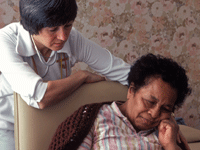
Providers have been advised to adapt older people’s services to meet the needs of an increasingly ethnically diverse population after a study suggested attitudes to care are rapidly changing.
Focus group research involving groups of people of Bangladeshi, Pakistani, Indian and black Caribbean ethnicity which has been exclusively shared with Community Care points to a decline in traditional values in which children were expected to care for their parents in their older age in many communities.
The study carried out by the research company Stimulating World and the public affairs consultancy Linstock said that in minority ethnic groups there was a strong emphasis on caring for elderly relatives as a duty with many first generation arrivals to the UK frowning upon the idea of sending relatives to care homes.
However, among the children of immigrants, the study states “the influence and adoption of a western lifestyle places extra pressures and strains on the traditional care models previously in existence within these communities”. Women’s increasing desire and ability to pursue careers mean that they are less likely to stay at home to become carers.
“Mobile western societies have been grappling with these stresses and strains for some time now, so their emergence amongst upwardly mobile black minority ethnic groups in the UK should not come as too much of a surprise,” the report states.
The findings come after the Runnymede Trust, the race relations think tank, last year projected that England and Wales’s ethnic minority population aged over-65 would increase five-fold to 3.8 million by 2051, 2.7 million of them from non-white backgrounds.
Runnymede’s research and policy analyst Omar Khan suggests that people from ethnic minorities were likely to move out of cites, retiring in rural or seaside areas where few lived at present.
He also warns that greater levels of poverty in ethnic minority communities mean that many members will be unable to self-fund social care, making it vital that local authorities “plan for their potentially different needs and preferences”.
Des Kelly, executive director of the National Care Forum, predicted there would be increasing numbers of care homes offering specialised services based on language, religion, culture and diet.
“Working out how to respond to these changing patterns of need is on the agenda of providers. A lot depends on geography and demand which determines whether it’s worth setting up a specialist service,” he said.
Projections of BME population aged over-65 in next decades
● 2007: 675,000
● 2026: 1.3 million
● 2051: 3.8 million (2.7 million from non-white backgrounds)
Source: The future ageing of the ethnic minority population of England and Wales, The Runnymede Trust 2010
Focus group responses from ethnic minorities
(source: Stimulating World and Linstock)
Family is everything
“They brought us up. It is our duty to look after them.”
Bangladeshi man, 42, London
“If I put my mum in a home the whole street would want to know why.”
Pakistani woman, 46, London
Changing values
“The longer you live in this country and the more education you have the more you move on from old fashioned values.”
Pakistani woman, 52, London
The need for culturally sensitive care homes
“A care home is good if he has his own community not if they can’t speak the language, doesn’t have the proper foodhe has to mix with his own society or he will be a vegetable and go downhill very quickly.”
Indian man, 59, London
Generational differences
“I don’t want to be a burdenI don’t want them to have the strain I told them to shoot me.”
Black Caribbean mother 47, London
“In times gone by our girls would go to primary school then leave to look after family, now they go onto further education and work” Bangladeshi father, 42, London
“In the future our children will not look after us.”
Pakistani woman, 52, Leicester
● Stimulating World and Linstock spoke to 50 people from different ethnic groups in London and Leicester. All were aged over 45 and considering long term care options for ageing relatives.
What do you think? Join the debate on CareSpace
Keep up to date with the latest developments in social care. Sign up to our daily and weekly emails
Related articles
Special report on social work and ethnic minority issues
The challenge facing care services of meeting the needs of older ethnic minority population


 Bournemouth, Christchurch and Poole
Bournemouth, Christchurch and Poole  Hampshire County Council
Hampshire County Council  Lincolnshire County Council
Lincolnshire County Council  Norfolk County Council
Norfolk County Council  Northamptonshire Children’s Trust
Northamptonshire Children’s Trust  South Gloucestershire Council
South Gloucestershire Council  Wiltshire Council
Wiltshire Council  Wokingham Borough Council
Wokingham Borough Council  Children and young people with SEND are ‘valued and prioritised’ in Wiltshire, find inspectors
Children and young people with SEND are ‘valued and prioritised’ in Wiltshire, find inspectors  How specialist refugee teams benefit young people and social workers
How specialist refugee teams benefit young people and social workers  Podcast: returning to social work after becoming a first-time parent
Podcast: returning to social work after becoming a first-time parent  Podcast: would you work for an inadequate-rated service?
Podcast: would you work for an inadequate-rated service?  Family help: one local authority’s experience of the model
Family help: one local authority’s experience of the model  Workforce Insights – showcasing a selection of the sector’s top recruiters
Workforce Insights – showcasing a selection of the sector’s top recruiters 

 Facebook
Facebook X
X LinkedIn
LinkedIn Instagram
Instagram
Comments are closed.